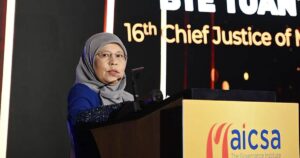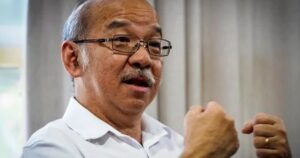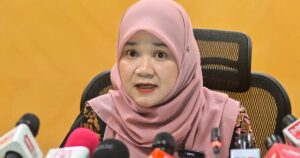
The rain had barely eased when athletics icons Zaiton Othman and Noraseela Khalid left on a quiet mission.
Their plan was simple: to honour two Olympians who once carried Malaysia’s hopes on the world stage, and had since slipped from public view.
Their first stop was a modest terrace house in Shah Alam. Inside, cycling great Ng Joo Pong lay in bed, six years after a stroke.
Once a national sprint and road race champion, he had long vanished from headlines.
Noraseela, president of the Malaysia Olympians Association (MOA), leaned close and handed him a framed citation and a pin bearing three letters — OLY, the post-nominal given to all who have competed at the Olympic Games.
“Some may have forgotten,” she said softly, “but we haven’t.”

They made two visits that day — the first in Shah Alam, the next in Serendah, where another Olympian, Junaidah Aman, waited.
When the door opened, three Malaysian sportswoman of the year winners from across generations, came face to face for the first time.
It was past three in the afternoon. The rain had delayed them, and Junaidah and her husband, former police officer Abdul Hafiz Abdul Karim, had waited without eating.
There was no ceremony, just a quiet meal shared by women who had once carried the nation’s hopes on the track.
For Zaiton, who was not an Olympian but one of Malaysia’s most decorated athletes, the visit felt deeply personal.
“We spoke the same language,” said Zaiton. “Athletes’ language — about pain, persistence and pride.”

Noraseela handed over the citation and OLY pin. “This belongs to you,” she said. “We just came to make it official.”
Junaidah turned the frame in her hands. “Fifty years,” she said quietly. “It feels like yesterday.”
The girl who outran asthma
Before Malaysia called her a track queen, Junaidah was an asthmatic schoolgirl from Taiping, Perak.
“I used to wheeze all the time,” she said. “But once I started running, I could finally breathe well.”
By 13, the student from Treacher Methodist Girls’ School was competing in the Perak Open. Her talent caught the eye of Shamsuddin Jaafar, a prisons department officer who coached part-time.
Two years later, she made her international debut at the 1969 SEAP Games in Rangoon — the youngest Malaysian track athlete ever sent to a major event.
She returned without a medal but with a goal. At the 1970 Bangkok Asian Games, she ran the 400 and 800 metres without reaching the finals.
But she caught the attention of national coach Bob Schul, the American Olympic gold medallist then serving in Malaysia under the Peace Corps.

“She moves too much in the shoulders,” Schul said then, “but once that’s fixed, she’ll fly.”
He was right.
At the 1971 SEAP Games in Kuala Lumpur, the 16-year-old stunned the crowd at Stadium Merdeka with a 56.1-second run in the 400 metres, breaking M Rajamani’s Games record.
She added gold medals in the 4x100m and 4x400m relays and a silver in the 200 metres.
That year, she was named national sportswoman of the year — the first of two consecutive wins.
On the world stage
In 1972, Junaidah stood at the starting line of the Munich Olympics. She clocked 57.36 seconds in her heat, finishing sixth.
“I was nervous,” she recalled. “But once I started running, everything disappeared.”
Before the Games, she had trained in the United States and West Germany — part of a Malaysian team that included T Krishnan, Ishtiaq Mubarak and Zainuddin Wahab.

“It was a privilege,” she said. “We learned what real preparation meant.”
Though she didn’t advance, her poise and easy stride left a mark. She ran like she belonged, and that mattered for every woman who came after.
She continued to race. At the 1973 SEAP Games in Singapore, she took bronze in the 4x400m relay and placed fourth in the 200m and 400m.
At the 1974 Asian Games in Tehran, she won bronze in the 400m with 55.78 seconds — still one of Malaysia’s best showings in the event.
By 1975, she retired to focus on her studies. The following year, she joined the Royal Malaysia Police as an officer. An injury ended her hopes of a comeback.
At the 1977 SEA Games, she carried the torch in the opening ceremony — a symbolic farewell to competition.
“Before Marina Chin, before me, before Noraseela — there was her,” said Zaiton, herself a former pentathlete and 1982 sportswoman of the year.
Junaidah brushed off the praise. “I was just lucky,” she said. “We had good coaches — and we believed we could run with anyone.”

Now 70, Junaidah lives a quiet life in Serendah with her family. She has nine grandchildren and a tenth on the way.
As they talked, the conversation drifted from barefoot races to blistered spikes and cinder tracks that tore skin.
“When we ran,” she said, “we ran for the flag, not for money.”
Restoring the Olympic chain
For Noraseela, who represented Malaysia in the 400m hurdles at the 2012 London Olympics, meetings like these are part of a larger mission.
Since taking over the MOA, she has been tracking down former athletes, many of them ageing quietly, unknown to younger fans.
Before this, the 2000 sportswoman of the year, had visited several others slowly restoring the links of Malaysia’s Olympic chain.
“We want them to know they’re still part of the family,” she said. “Sometimes it’s just a visit, a small pin, but it tells them: you’re remembered.”
The initiative has reached Olympians across several states. Some, like Joo Pong, can no longer travel or speak. Others still recall every performance with some precision.
“That visit meant something,” said Zaiton. “We talk about medals and progress, but in the end it’s about people — about remembering.”
Two visits in one day, two lives separated by decades, both stitched back into Malaysia’s sporting story.
For Noraseela, it was a start. “We’ll find them, one by one,” she said. “They deserve to be seen again.”
Each visit restores a missing piece of Malaysia’s Olympic story — proof that even when time forgets, the spirit endures.






